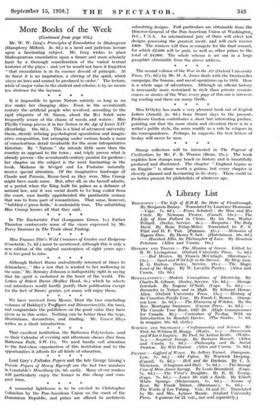It is impossible to ignore Nature entirely so long as
we live under her changiirg Skies. Even in the seventeenth century the artificial people who revolved, according to the rigid etiquette of St. Simon, about the Rai Soleil were frequently aware of the charm of woods and waters : Miss Phyllis Crump proves it in her Nature in the Age of Louis XIV
(Rontledge. 10s. 6d.). This is a kind of advanced university thesis, sternly refusing psychological speculation and imagin- ative composition, but arranging under various heads a mass of conscientious detail invaluable for the more interpretative
historian. 'By " Nature " she intends little more than the country as opposed to the town ; and triply proves what is already proven-the- seventeenth-century passion for gardens : her chapter on • the - subject is the most fascinating in the book. - Madame de Sevigne and La Fontaine naturally receive special attention. " Of the imaginative landscape of Claude and Poussin, Rome-bred as they were, Miss Crump might have made more. But, after all, as she herself admits,
at a period when the King built his palace as a defiance of natural law, and it was social death to b e long exiled from the court, men hardly apprehended the pantheistic ecstasy that was to form part of romanticism. That some, however, "-babbled o' green fields," is undeniably true. The unbabbling Miss Crump knows all that they said.






































 Previous page
Previous page